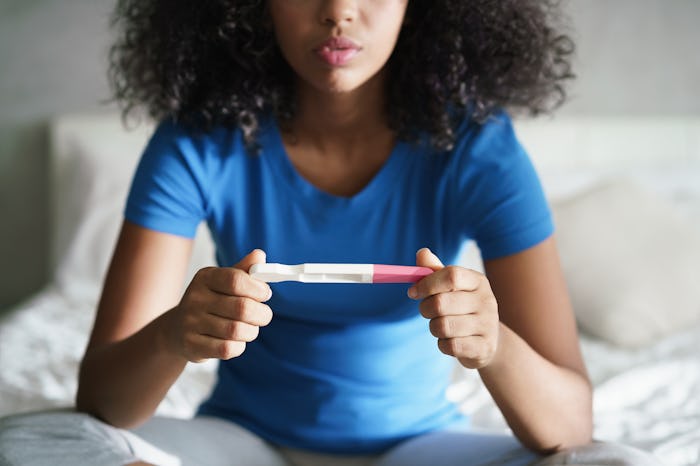Life

If You Ovulate Later Than Usual, Here's How It Affects Your Chances Of Conceiving
Dealing with an irregular menstrual cycle can complicate many things, and not only because you need a constant stash of backup tampons. When you're trying to conceive, even a little variability in your cycle can make the whole journey toward pregnancy more difficult. But can you ovulate late and get pregnant, or does that process need to work on a set schedule? There's a lot to know about ovulation, timing, and pregnancy.
For the most part, it's totally possible to ovulate late and still get pregnant. "Absolutely — very few women indeed ovulate exactly the same day/time every month," Dr. Mary Jane Minkin, clinical professor in the Department of Obstetrics, Gynecology, and Reproductive Sciences at the Yale University School of Medicine, tells Romper via email. Even for people with fairly predictable cycles, Minkin encourages them to have sex a couple of days ahead of their anticipated cycle. So if a person expects to ovulate on day 15 of their cycle, then intercourse on days 13 and 15 are good targets. Minkin does caution against having sex more than once a day, as that may deplete the sperm count.
Of course, this is a very personalized type of recommendation, so definitely consult with your own doctor about the best times to have sex if you're trying to conceive with a somewhat irregular cycle. You may be advised to try for daily sex around the time of your expected ovulation, for example.
There's another way to take the guesswork out of your ovulation timing, particularly for people with irregular cycles. "And to really track ovulation: ovulation predictor kits are the way to go," says Minkin, who recommends the First Response brand. Minkin suggests using the ovulation kits and keeping a record of the results (i.e., keep track of the times you're generally ovulating). This can be helpful info for your doctor if you go in for a check-up related to conception. There are plenty of different ways to measure ovulation, so check out the guide to ovulation tests on Romper. There are wands, digital versions, and test strips, so you have a whole selection of choices.
With that in mind, visiting your doc is the next step. "Now if a woman is 35 or over and has been trying to get pregnant for six or more months, I would encourage her to check in with her gyn care provider," says Minkin. People under the age of 35 who have been trying to get pregnant for over a year are also advised to see a doctor at this time. This is when a detailed record of your ovulation times could be especially helpful info.
Also, remember that people with irregular cycles still have babies every day, so it's OK if your ovulation seems to have a mind of its own. (Really, ovulation times will vary a little from month to month, even for people with fairly regular cycles.) With a little help from your doc or an ovulation test kit, it will be easier to spot that important window of fertility.
This article was originally published on